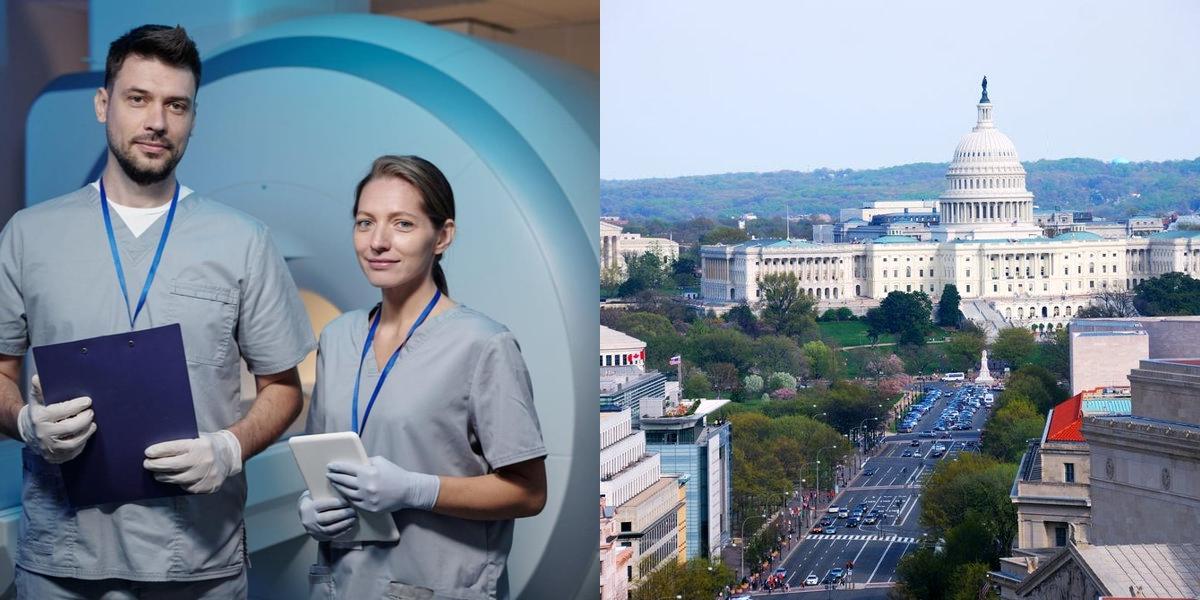How to Become a Radiology Technician in District of Columbia

Radiology technicians play a crucial role in the healthcare industry by assisting in diagnosing and treating various medical conditions. They perform imaging exams, such as X-rays, CT scans, and MRIs, to help doctors identify and evaluate patients' injuries, diseases, or abnormalities. If you want to pursue a career as a radiology technician in the District of Columbia, here are the key points you need to know.
Step 2: Network
Networking is a valuable tool for finding job opportunities in any field, and radiology technology is no exception. Reach out to professionals in the field, such as radiology technicians, radiologists, or healthcare administrators, and let them know you are seeking employment. Attend industry events, join professional organizations, and utilize online platforms to expand your network.
Step 3: Research Job Opportunities
Research job opportunities in your area by checking online job boards, hospital websites, and healthcare staffing agencies. Many healthcare facilities also hold job fairs or recruitment events, which can be excellent opportunities to meet potential employers and learn more about available positions.
Step 4: Prepare for Interviews
Once you have secured an interview, it is important to prepare thoroughly. Research the healthcare facility or organization you are interviewing, and familiarize yourself with their values, mission, and services. Prepare answers to common interview questions and practice your responses to ensure you come across as confident and professional.
During the interview, highlight your relevant skills and experience and demonstrate your passion for radiologic technology. Be prepared to discuss any challenging situations you have encountered during your clinical training and how you overcame them. Remember to dress professionally, arrive on time, and bring the necessary documents or certifications.
Step 5: Continuing Education
As a radiology technician, it is important to stay updated on the latest advancements and technologies in the field. Continuing education courses and seminars can help you expand your knowledge and skills, making you a more competitive candidate for future job opportunities. To broaden your career prospects, consider obtaining additional certifications or specialized training in areas such as computed tomography (CT) or magnetic resonance imaging (MRI).
Career Paths and Opportunities after Becoming a Radiology Technician
Becoming a radiology technician opens the door to various career paths and opportunities within medical imaging. Here are some potential career options you can explore after obtaining your radiology technician certification.
Radiologic Technologist
As a radiologic technologist, you will perform various imaging procedures, such as X-rays, CT scans, and mammograms. You will work closely with radiologists and other healthcare professionals to obtain accurate and high-quality images for diagnosis and treatment purposes. Radiologic technologists can work in hospitals, clinics, imaging centers, or physician offices.
Computed Tomography (CT) Technologist
CT technologists specialize in performing CT scans, which provide detailed cross-sectional images of the body. They work closely with patients to explain the procedure and ensure their comfort and safety during the scan. CT technologists may also administer contrast agents to enhance the visibility of certain structures or abnormalities.
Magnetic Resonance Imaging (MRI) Technologist
MRI technologists operate MRI scanners, which use powerful magnets and radio waves to generate detailed images of the body's internal structures. They work closely with patients to ensure their safety and comfort during the procedure and obtain high-quality images for accurate diagnosis. MRI technologists may also administer contrast agents in certain cases.
Interventional Radiologic Technologist
Interventional radiologic technologists assist radiologists in performing minimally invasive procedures using imaging guidance. These procedures may include angiography, biopsies, or the placement of catheters or stents. Interventional radiologic technologists play a crucial role in patient care by ensuring the accuracy and safety of these procedures.
Radiology Department Supervisor
After gaining experience as a radiology technician, you may pursue a supervisory or managerial role within the radiology department. As a department supervisor, you will oversee the daily operations, manage staff, and ensure compliance with regulatory requirements. This role requires strong leadership and communication skills and in-depth knowledge of radiologic technology.
Education and Research
If you have a passion for teaching and research, you may consider a career in education or research. As an educator, you can teach radiologic technology students or provide continuing education courses for practicing radiology technicians. In the research field, you can contribute to advancements in medical imaging technology or explore new applications for existing techniques.
Final Thoughts
Becoming a certified radiology technician is a rewarding career that offers many healthcare industry opportunities. Following the steps outlined above, you can obtain your radiology technician certification and increase your chances of securing a job in this field. Remember to stay updated on the latest advancements and technologies, as continuing education is essential for long-term success in this dynamic field. Whether you specialize in a specific area or pursue a leadership role, a career as a radiology technician can provide a fulfilling and promising future.
If you're someone who values exploring multiple career options and wants to find the best match for your interests, feel free to check out these additional articles:

Athena is Co-founder and CEO of Dreambound.




